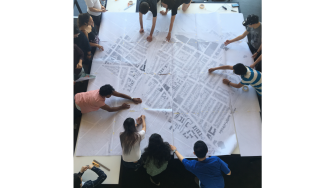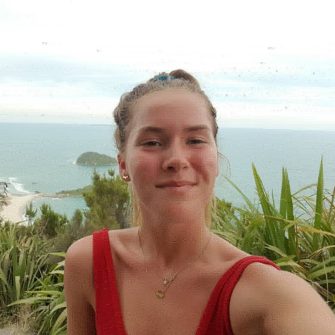Master of City Planning
- Commencing Terms
- Term 1 & 3
- Duration
- 2 Year(s)
- Delivery Mode
- Face-to-face (includes blended)
- Campus
-
Kensington
- Codes
- Program code 8148
- CRICOS code 088355A
-
Commonwealth Supported Places are available for this program2026 Indicative CSP first year fee
- $9,500*
-
2026 Indicative CSP fee to complete degree
- $19,500*
-
2026 Indicative first year full fee
- $49,000*
-
2026 Indicative full fee to complete degree
- $102,500*

Application closures for 2026
International applications for all undergraduate programs, as well as postgraduate programs offered by the faculties of Arts, Design & Architecture, Engineering (excluding Master of Information Technology and associated programs) and Science are now closed to New Overseas Student Commencement (NOSC) for 2026 intakes.
Postgraduate programs offered by the Business School and the faculties of Law & Justice and Medicine & Health remain open. Master of Information Technology (and associated programs) also remain open.
- Overview
- Entry requirements
- What will I study?
- Future careers
- How to apply
- Fees & Scholarships
Overview
The Master of City Planning at UNSW is a two-year, professionally accredited postgraduate degree that allows you to bring experience from previous study to launch a career in urban and regional planning.
City planning is an exciting, varied and progressive profession that plays a pivotal role in decisions shaping the future of cities and regions. Through a career in planning, you’ll improve lives by designing cities that are sustainable, equitable, healthy and inspiring.
As part of the Faculty of Arts, Design & Architecture you’ll join a uniquely interdisciplinary and supportive community. You’ll work alongside students and professionals from across the built environment, just as you would in the workplace. You’ll benefit from UNSW’s strong ties to industry and world-leading research in city planning, as you explore diverse subjects including city renewal, city analytics, housing policy and healthy sustainable communities.
In your second year you’ll undertake a major capstone project, which allows you to deepen your expertise in an area of specialisation and empowers you to kick-start your career by adding to your professional portfolio.
Key features
The key features and subject areas in this degree will see you explore a broad range of urban issues through theory and practice, preparing you for diverse, future-focused careers. Areas of study include:
- Urban design
- City economics and development
- Environment and sustainability
- City building – infrastructure and transport
- Strategic spatial planning
- Planning law and administration
- Planning research and analysis
- Urban management and development assessment
- Urban equity and health
- City analytics
Why study at UNSW?
- Gain professional accreditation with the Planning Institute of Australia (PIA)
- Connect with Australia’s leading urban research centre, the City Futures Research Centre
- Adobe Creative Cloud subscription included from the day you start for the duration of your studies
- Study in and learn from one of the world’s great cities. Sydney will be your classroom
- Establish networks through our strong industry links and partnerships
- Study at a Built Environment school ranked #1 in Sydney and #23 globally for architecture & built environment (QS World University Rankings by Subject, 2025).
- Prioritise career success – UNSW has been awarded Most Employable students for six years in a row (Australian Financial Review (AFR) Top100 Future Leaders Awards, 2020–2025)
- Be supported by our diverse, open and inclusive Arts, Design & Architecture community
- Access world-class alumni connections
- Join a global top 20 university (QS World University Rankings, 2024–2026)
- Join a community that’s part of the prestigious Group of Eight (Go8) universities
Want to see more from UNSW Arts, Design & Architecture?
Entry requirements
To gain entry into the Master of City Planning, you’ll need a bachelor’s degree with a credit average or above (Weighted Average Mark 65+).
If you have already completed an Australian planning degree that is accredited by the Planning Institute of Australia, this program is not designed for you. Instead, please consider the Master of Property and Development, the Master of Landscape Architecture or the Master of Environmental Management.
If you have an undergraduate degree in a cognate discipline, or you’ve partially completed a relevant postgraduate program, you can apply to have this study recognised via Recognition of Prior Learning (RPL). If your prior study is recognised, credit for certain subjects will be counted towards the Master of City Planning.
What is a cognate discipline?
City and urban planning are interdisciplinary in nature, which is why we recognise the benefits that students from diverse academic backgrounds bring to this program. If you’ve studied any of the following subject areas in your undergraduate degree, you may be eligible for RPL.
- Built environment subject areas, including: architecture, landscape architecture, construction, property development and urban design.
- Social, economic and environmental science subject areas, including: geography, urban studies and sociology, demography, economics, social policy and politics, communication studies, health studies, international development, environmental ecology, environmental management, environmental sustainability.
- Law/Jurisprudence
- Environmental and civil engineering subject areas, including surveying and spatial science degrees.
RPL for these study areas will be limited to 24 Units of Credit (UOC), which is normally the equivalent of 4 subjects.
Admission pathways
If you don’t meet the entry requirements outlined above, you may be eligible to study the Graduate Certificate in City Planning, then continue into the Master’s degree once this is complete. This will be at the discretion of the Program Director or Academic Coordinator who assesses applications on a case-by-case basis.
English language requirements
You may be asked to provide evidence of your English proficiency to study at UNSW depending on your educational background and citizenship. English language skills are vitally important for coping with lectures, tutorials, assignments and examinations - this is why UNSW requires a minimum English language competency for enrolment.
If you’re completing an Australian Year 12 qualification (e.g. NSW HSC or equivalent), you do not need to provide anything extra to prove your proficiency. Your qualification will be used as evidence of your English proficiency.
If you do need to provide evidence of your English proficiency, this will be indicated in your application. You can prove this by providing evidence that you meet one or more of the following criteria:
- English language tests and university English courses
- Prior study in the medium of English
- Other qualifications
If you need to improve your English skills before you start your degree, UNSW College’s Academic English Programs are for you. The programs are suitable for various English levels and help you prepare for university studies and life in Australia.
For more details, visit the English Language Requirements page.
To gain entry into the Master of City Planning, you’ll need a bachelor’s degree with a credit average or above (Weighted Average Mark 65+).
If you have already completed an Australian planning degree that is accredited by the Planning Institute of Australia, this program is not designed for you. Instead, please consider the Master of Property and Development, the Master of Landscape Architecture or the Master of Environmental Management.
If you have an undergraduate degree in a cognate discipline, or you’ve partially completed a relevant postgraduate program, you can apply to have this study recognised via Recognition of Prior Learning (RPL). If your prior study is recognised, credit for certain subjects will be counted towards the Master of City Planning.
What is a cognate discipline?
City and urban planning are interdisciplinary in nature, which is why we recognise the benefits that students from diverse academic backgrounds bring to this program. If you’ve studied any of the following subject areas in your undergraduate degree, you may be eligible for RPL.
- Built environment subject areas, including: architecture, landscape architecture, construction, property development and urban design.
- Social, economic and environmental science subject areas, including: geography, urban studies and sociology, demography, economics, social policy and politics, communication studies, health studies, international development, environmental ecology, environmental management, environmental sustainability.
- Law/Jurisprudence
- Environmental and civil engineering subject areas, including surveying and spatial science degrees.
RPL for these study areas will be limited to 24 Units of Credit (UOC), which is normally the equivalent of 4 subjects.
Admission pathways
If you do not meet the requirements for direct entry into your chosen degree, you may be eligible for a pathway program with UNSW College. UNSW College provides alternative entry options using university-approved content so that you can start your UNSW journey with confidence.
You may also be eligible to study the Graduate Certificate in City Planning, then continue into the Master’s degree once this is complete. This will be at the discretion of the Program Director or Academic Coordinator who assesses applications on a case-by-case basis.
English language requirements
You may be asked to provide evidence of your English proficiency to study at UNSW depending on whether you are from an English-speaking background or non-English speaking background. English language skills are vitally important for coping with lectures, tutorials, assignments and examinations - this is why UNSW requires a minimum English language competency for enrolment.
If English is not your first language, you’ll need to provide proof of your English proficiency before you can be given an offer to study at UNSW. You can do this by providing evidence that you meet one or more of the following criteria:
- English language tests and university English courses
- Prior study in the medium of English
- Other qualifications
If you need to improve your English skills before you start your degree, UNSW College’s Academic English Programs are for you. The programs are suitable for various English levels and help you prepare for university studies and life in Australia.
For more details, visit the English Language Requirements page.
Check the specific English language requirements for this program
What will I study?
UNSW is introducing a new academic calendar from 2028.
We are moving to a new flex-semester calendar. What does this mean for your studies?
Program structure
The Master of City Planning is a two-year full-time degree. It involves 13 courses plus a capstone project.
Full program structure
Each university year at UNSW has three terms and an optional summer study period.
You can study full-time or part-time. Depending on how you plan your study load, you can fit two or three courses into a term and one course in a summer term.
Below is a summary of what you will study in a standard two-year, full-time study plan:
- 9 Core City Planning courses
- 4 Prescribed electives
- 1 Capstone project
Capstone Project
In your final year of study, you'll undertake a major capstone project, where you’ll focus on a particular area of specialised interest and build further depth and expertise to the critical ideas and knowledge you have already gained. For the capstone project you can choose between an independent research thesis or a major urban design studio, depending on your skills and interests.
This means you’ll graduate with advanced skills and a specialised project that will set you apart as you kick-start your career. For full course listing, descriptions and timetables please see the UNSW Online Handbook.
Optional specialisation in City Analytics
If you are interested in how big data and urban analytics are reshaping our cities, you may want to consider incorporating the City Analytics specialisation into your degree. This involves choosing all four prescribed electives from a selection of city analytics-focused subjects, which have been designed to provide you with the skills you need to put data to work in shaping our future cities. In this specialisation, you can also focus your final capstone project on the use of data and analytics in city planning. For more information about the City Analytics specialisation see the UNSW Online Handbook.
Future careers
The Master of City Planning will prepare you for a career through which you can drive solutions to grand challenges like climate change and inequality.
Our graduates are in-demand and work in planning and urban policy-related roles across all tiers of government (Federal, State, Local), as well as in private sector consultancies, property development, and other built environment professions where planning skills are required.
The electives you choose can enable you to move into specialist areas with diverse positive impacts, like housing, city analytics or urban design. You’ll also gain interdisciplinary skills that will enable you to move into wider policy, research, analytical, creative and community roles.
Potential careers
- Strategic Planner
- Local Government Planner
- Social and Community Planner
- Environmental Planner
- Urban Consultant
- Urban Policy Analyst
- Urban Policy Officer
- Transport Planning
- Urban Designer
- Heritage Officer
- Property Developer
- Urban Data Analyst
Accreditation
Planning Institute of Australia
How to apply
Applications must be submitted through our Apply Online portal. We encourage you to submit your completed application as early as possible to ensure it will be processed in time for your preferred term. Some high-demand programs and Faculties with limited places may have an earlier application deadline or commencement date. Find out more.
Ready to start your application?
For most international students, applications are submitted via our Apply Online service. We encourage you to submit your completed application as early as possible to ensure it will be processed in time for your preferred term.
Some high-demand programs with limited places, may have an earlier application deadline or may have an earlier commencement date. For details, visit the international admissions information page.
Ready to start your application?
Fees & Scholarships
There are a limited number of Commonwealth Supported Places (CSP) available for this degree/program. Your eligibility to receive a CSP will be automatically assessed when you apply, please ensure you preference the CSP code in UAC to be considered. Start your postgraduate application today with our guide on how to apply.
Please note that eligibility for Commonwealth Supported Places (CSPs) is competitive, with places awarded based on academic merit. To find out more about Commonwealth Supported Places visit Postgraduate Commonwealth Support.
Commonwealth Study Assistance such as Austudy, and Youth Allowance is available for some master’s degrees. For the most up-to-date information and list of degrees visit UNSW Current Student Financial Support.
*The indicative Commonwealth Supported Place (CSP) fees are an estimate based on the relevant student contribution band/s for a Commonwealth Supported Place undertaking a standard full-time load of 48 units of credit per year (1 Equivalent Full Time Student Load/1 EFTSL). To find out more about Commonwealth Supported Places visit Postgraduate Commonwealth Support.
Indicative fees are a guide only and have been calculated based on the typical enrolment patterns of students undertaking the degree/program. The indicative fee listed here is an estimate for tuition only and excludes non-tuition fees and charges. The amount you pay will vary depending on the calendar year of enrolment, the courses you select and whether your study load is more or less than 1 Equivalent Full Time Student Load (48 units of credit (UOC) per year).
You should not rely on indicative fees as fee increases are assessed when required and may exceed the indicative figures listed here. Actual fees are calculated on enrolment. More information on fees can be found at the UNSW fees website.
*Fees are subject to annual review by the University and may increase annually, with the new fees effective from the start of each calendar year. The indicative fees listed here are based on an estimated average and are for tuition only, other fees and charges are not included. The amount you pay will vary depending on the calendar year to enrol, the courses you select and whether your study load is more or less than 1 Equivalent Full Time Student Load (8 courses per year).
Indicative fees are a guide for comparison only based on current conditions and available data. You should not rely on indicative fees. More information on fees can be found at the UNSW fees website.
Indicative fees to complete the program have been calculated based on a percentage increase for every year of the program. Fee increases are assessed annually and may exceed the indicative figures listed here.
Indicative fees to complete the program include tuition plus an estimate of study-related costs of approximately $1,000 per year. To find out more about other costs, visit UNSW International.
Scholarships
At UNSW, we award over $83 million in scholarships each year. We pride ourselves on rewarding excellence and making university accessible to students from all walks of life. Whether you’re a domestic or international student, our range of scholarships, prizes and awards can support your journey.
Progress starts here – at a world-leading university

Top 20 Worldwide
Ranked in the global top 20 for three consecutive years
QS World University Rankings, 2024–2026

Winner of the AFR Most Employable University Award six years in a row
AFR Top100 Future Leaders Awards, 2020–2025

Australia's #1 for Innovation
Highest number of startups and spinouts from university-developed tech
SCOPR report, 2024





